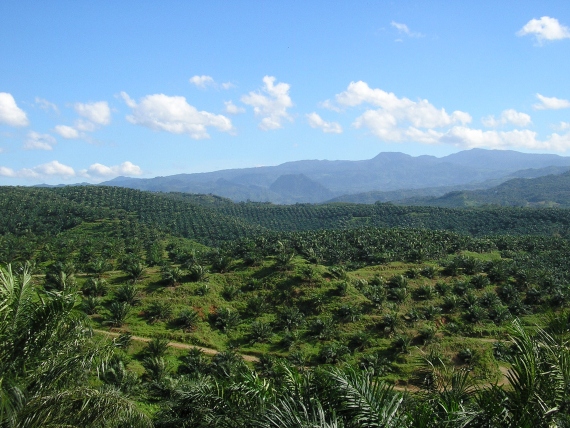“Palm oil free” has become an advertising slogan for many products, which may lead to the belief that this ingredient has harmful effects on health. But even though it is not the healthiest fat in the world, palm oil’s fall from grace is actually due to environmental reasons. In Southeast Asia, deforestation to meet the global demand for this product is decimating the habitat of endangered species and contributing to climate change, which has led to a groundswell of support for a boycott. However, experts warn that the alternative may be even worse.
The fat extracted from the fruit of the palms in the genus Elaeis has traditionally been used in Africa and Asia as cooking oil. Its rise to the global market was due to the food industry’s interest in replacing so-called trans fats, produced by hydrogenating vegetable oils to obtain a more solid product that gives texture to processed foods. When, in the 1990s, trans fats were linked to adverse effects on cardiovascular health, the need to find an alternative arose. The giant Unilever opted for palm oil, solid but spreadable at room temperature, odourless and colourless, stable and resistant to oxidation. It was also cheap, which quickly attracted the attention not only of the entire food industry, but also of manufacturers of soaps, detergents, shampoos and cosmetics, and even biofuel producers.

Today, palm oil is a ubiquitous ingredient that we consume at a rate of eight kilos per person per year and that is present in almost 50% of the packaged products we find on supermarket shelves. Since the 1980s, the land area devoted to its harvest has more than tripled, and it now occupies 10% of cultivated land worldwide, but supplies 35% of vegetable oil globally. In Indonesia, which together with Malaysia covers 85% of the demand, the land dedicated to the oil palm has increased 22-fold in four decades. 77% of palm oil is used in food, but Europe and the US only absorb 14% of production; Indonesia, China and India consume almost 40%. Global production is expected to quadruple by 2050.
Health benefits, environmental and socio-economic impacts
From a nutritional point of view, palm oil does not match the healthy profile offered by olive oil, as it has more saturated and less monounsaturated fats, but its balance is more favourable than that of coconut oil or palm kernel oil. Although there is divergent data on its possible health benefits, it has come to be described as a “tropical equivalent of olive oil.” Its main problem, however, is its environmental impact: in South-East Asia, 45% of plantations occupy land which in 1989 was tropical rainforest. The decline of these jungles affects the survival of threatened animals such as the pygmy elephant of Borneo, orangutans, tigers or the rhinos of Sumatra. In addition to the loss of biodiversity, the disappearance of these forests aggravates climate change by releasing stored carbon, which is also contributed to by the conversion to carbon-rich peatland plantations. Finally, the exploitation of workers and the use of child labour have also been condemned.

As a result, some organisations and even governments have called for a boycott of palm oil, while brands and food chains have signed up to reject this ingredient. The problem, experts warn, is that giving up palm oil would require us to find another, more sustainable option, and oil palm is more efficient than other vegetable oil crops, producing more per unit of land; soy, coconut or canola require between four and ten times more land than palm to yield the same amount of oil. According to Nanyang Technological University (Singapore) ecologist Eleanor Slade, who has studied the problem extensively, replacing palm with soy would shift production to the Amazon, where that crop would double the deforestation caused by oil palms in Asia.
As Slade told OpenMind, “consumption and production of oil palm is indeed a complex issue,” not only because of the environmental impact, but also because this crop “has provided many social and economic benefits, and raised many out of poverty.” Thus, Slade adds, “boycotting palm oil also has socio-economic impacts for the developing countries where it is produced, and is something not often considered by consumers, and why Malaysia has been so upset with the EU over its bans on palm oil.”

For ecologist Erik Meijaard of the University of Kent and the conservation consultant for Borneo Futures, “if you don’t understand the impact of a palm oil boycott on sustainability goals you need to be very careful pushing for one.” In particular, Meijaard stresses in a recent review, the environmental impact of other vegetable oils has not yet been sufficiently studied. “Saying no to palm oil means saying yes to other oil crops, and it is clear that we do not understand the consequences of this displacement of the problem,” Meijaard told OpenMind. Furthermore, adds the ecologist, boycotts are promoted from Europe, the US and Australia, which are all minority consumers, so their effect is minimal.
Look for certified palm oil product, the alternative to the boycott
As an alternative to the boycott, experts favour the certification of sustainable production. This is the mission of the Roundtable for Sustainable Palm Oil (RSPO), an initiative of producers, the industries involved and NGOs with their local equivalents in Malaysia (MSPO) and Indonesia (ISPO). Currently, 20% of production is certified, which means “zero deforestation, no planting on peatlands, standards across the whole supply chain from producers to consumers, and protections for workers,” summarises Slade. According to the ecologist, “in that sense, the oil palm industry goes further than many others.” The EU has actively supported certification, so, Meijaard notes, promoting boycotts is inconsistent and “reduces pressure on the industry to further improve production standards.”
“Rather than boycotting palm oil per se, I would encourage consumers to look for RSPO and certified palm oil products, and to actively engage in supporting certified, sustainable production,” suggests Slade. But certification is not an easy path either; interestingly, the ecologist explains, large companies such as Nestlé, Unilever, Palmolive, Ferrero or L’Oréal already use only certified palm oil in all their products: “You’ll be surprised how many products do actually already contain certified palm oil!” However, many companies prefer not to publicise it “because of the bad press of palm oil in the media.” In contrast, other brands tout the absence of this oil in their products, without the consumer really knowing what ingredient has been used as a substitute or what its impact is.

In the end, concludes Slade, palm oil does not pose problems that are very different from those of many other products. “We need to recognize that as a global population we are driving deforestation and biodiversity loss through multiple consumer choices, of which consumption of palm oil is only one.” There is also coffee, chocolate, coconut… and, of course, meat from livestock, which is responsible for more deforestation than palm oil. “Few products are without some sort of environmental footprint, and the ideal situation is that we reduce our footprint by sourcing sustainably produced and certified food.”
Comments on this publication